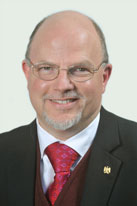FOCUS ON

Symposium
on languages
The NWU hosted a symposium on languages for higher education on 31 October in Potchefstroom. Eish! Spoke to Prof Robert Balfour, deputy vice-chancellor for teaching and learning, about this event.
Prof Robert Balfour is the deputy vice-chancellor for teaching and learning. Q: Why did the NWU hold a symposium on languages?
Q: Why did the NWU hold a symposium on languages?
A: The symposium was part of the consultation process that precedes the university’s language audit – which will in fact also be a consultative event – that will take place in March 2018. After that, a new language policy will be developed and submitted to Council in June 2018.
Q: Who organised the symposium, and who attended it?
A: The event was organised by the language policy and plan task team, the office of the deputy vice-chancellor for teaching and learning and the language directorate of the NWU. Approximately 100 guests, including members of staff, students, members of the media and various experts, attended the event.
Q: Could you tell us more about the format of the symposium?
A: Firstly, Prof Mbulungeni Madiba, an associate professor and co-ordinator of the Multilingual Education Project at the University of Cape Town, gave his keynote address.
He believes that multilingualism is better than only English. In fact, Mbulungeni pointed out that the issue of language played a role in the national student protest movement and that English is also at the heart of poor throughput rates.
According to him, multilingualism is about the use of more than one language when teaching, to improve the students’ understanding and conceptualisation. He said that this also creates space for the development of African languages as academic languages.
Mbulungeni’s address was followed by two panel discussions which focused on the development of African indigenous languages for higher education, as well as the role of English in higher education in the context of multilingualism.
There was also an opportunity for guests to ask questions and give their inputs.
Q: Who were the experts leading the first panel discussion, and what did they say?
A: The first panel’s experts included Lebohang Mathibela of the Faculty of Humanities, JWP Mashike, deputy chairperson of the Setswana National Language Body, Prof Shole Shole of the Faculty of Humanities, Dr Conrad Steenkamp of the Afrikaans Language Council and Prof Gert van der Westhuizen, chair of the National Language Body for Afrikaans.
Interesting viewpoints that these experts raised were the following:
- We should embrace the multilingual diversity that we have.
- Setswana is ready for wider use in higher education.
- Monolingualism is a threat in which powerful languages edge out other languages.
Q: Could you tell us more about the second panel discussion?
A: The second panel’s participants were Prof Rosemary Cromarty of the Faculty of Education, Prof Susan Coetzee-van Rooy, deputy dean of the Faculty of Humanities, Dr Dumisile Mkhise of the Faculty of Education and Prof Nhlanhla Maake, chair of the National Language Body for English.
The following are some of their perspectives:
- Unless language stimulation occurs in the early years of a child’s development, it hampers learning in all areas later in their lives.
- In 1976, resistance to Afrikaans resulted in an uncritical adoption of English and in 1994 insufficient attention was given to the role of African languages in learning and teaching.
Q: Were the current interpretation services mentioned?
A: Yes, there were two conflicting student contributions. One was that the campus in Potchefstroom should stop interpretation and have parallel Afrikaans and English classes, while the other was that interpretation on the campus works well and provides for student access and integrated classrooms.
Q: What is the next step after this symposium?
A: The draft language policy and plan provided to Senate in June 2017 will thus be revisited in the light of discussions and inputs made at the symposium. The draft policy and plan will then be circulated to a range of stakeholders, including faculties, student councils, support divisions, Convocation and Council in the course of 2018, based on the consultative process already described.